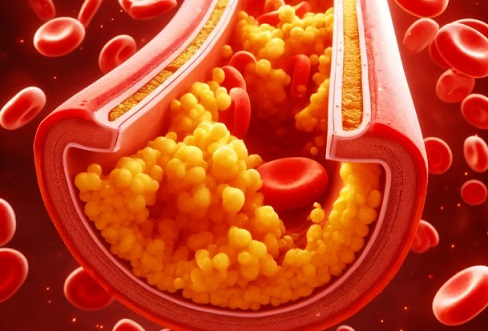COVID-19 Causes Dyslipidemia in Those with Diabetes, Increasing Risk for Atherosclerotic Complications
Nikhil Prasad Fact checked by:Thailand Medical News Team Dec 06, 2024 4 months, 1 week, 5 hours, 16 minutes ago
Medical News: New research sheds light on a concerning link between COVID-19 and metabolic health in individuals with diabetes. The study highlights how the infection can lead to long-term cholesterol imbalances, increasing the risk of heart and vascular diseases.
 COVID-19 Causes Dyslipidemia in Those with Diabetes, Increasing Risk for Atherosclerotic Complications
Diabetes and COVID-19: A Risky Combination
COVID-19 Causes Dyslipidemia in Those with Diabetes, Increasing Risk for Atherosclerotic Complications
Diabetes and COVID-19: A Risky Combination
The COVID-19 pandemic has had devastating effects worldwide, but its impact on people with diabetes has been particularly severe. Individuals with Type 2 diabetes are already vulnerable to complications from infections, and COVID-19 has only magnified these risks. A study conducted by researchers from Yalova Altınova State Hospital, Kütahya Health Sciences University, and Eskisehir City Hospital in Turkey has uncovered a new challenge for this group: dyslipidemia, a condition characterized by abnormal cholesterol levels, which may increase the risk of atherosclerosis.
This
Medical News report explores the findings of the study, which investigated how COVID-19 impacts metabolic health, especially in diabetic patients. The researchers aimed to understand changes in cholesterol and blood sugar regulation over the medium and long term.
Study Design and Key Methods
The study analyzed data from 127 patients with Type 2 diabetes who visited outpatient clinics in Turkey during 2021. Two groups were compared: 64 patients who had moderate or severe COVID-19 and 63 patients who did not contract the virus. The researchers examined changes in key health parameters over six months, including HbA1c levels (a marker of long-term blood sugar control), LDL cholesterol, HDL cholesterol, and total cholesterol.
The research adhered to rigorous ethical standards, receiving approval from Kütahya University of Health Sciences. It was conducted following the Declaration of Helsinki and the Good Clinical Practice Directive.
Surprising Cholesterol Changes
One of the most striking findings was the significant increase in cholesterol levels among diabetic patients who had COVID-19. LDL cholesterol (often referred to as "bad cholesterol"), HDL cholesterol ("good cholesterol"), and total cholesterol all rose significantly in these patients over six months.
For instance:
-LDL cholesterol increased from an average of 113.7 mg/dL to 124.9 mg/dL.
-HDL cholesterol rose from 42.9 mg/dL to 52.3 mg/dL.
-Total cholesterol jumped from 193.1 mg/dL to 216.1 mg/dL.
In contrast, the group without COVID-19 showed only minor changes in their cholesterol profiles.
Blood Sugar Control: Unexpected Improvements
Interestingly, the study found no significant worsening of blood sugar regulation in diabetic patients who had COVID-19. On the c
ontrary, their average HbA1c levels decreased slightly from 8% to 7.7%. This improvement was attributed to closer medical follow-up and stricter treatment regimens during and after hospitalization. For the group without COVID-19, HbA1c also improved, dropping from 7.9% to 6.9%.
What Do These Findings Mean?
The increase in cholesterol levels among diabetic patients who had COVID-19 is a cause for concern. High LDL cholesterol is a known risk factor for atherosclerosis - a condition where arteries become clogged with fatty deposits, leading to heart attacks and strokes. The rise in HDL cholesterol, while usually considered positive, does not offset the potential harm caused by elevated LDL and total cholesterol levels.
The researchers hypothesize that COVID-19 may disrupt lipid metabolism through inflammation and cellular damage. The virus uses the ACE-2 receptor to enter cells, and this mechanism might also affect organs like the pancreas and liver, which are crucial for metabolic health.
Broader Implications for Diabetes Management
The findings suggest that COVID-19 has long-term effects on metabolic health that go beyond its immediate respiratory symptoms. For individuals with diabetes, this underscores the importance of ongoing monitoring and management of cholesterol levels after recovering from the virus. Regular lipid panels, lifestyle adjustments, and potentially medication to control cholesterol may be necessary to mitigate cardiovascular risks.
The pandemic's impact on lifestyle - reduced physical activity and dietary changes - may also have played a role in these metabolic shifts. While this study did not specifically measure physical activity, it is well-known that a sedentary lifestyle can worsen lipid profiles.
Limitations of the Study
The researchers acknowledged several limitations. The average age of patients who had COVID-19 was slightly higher than those who did not, which could have influenced the results. Additionally, the study's retrospective design and relatively short follow-up period of six months limit the ability to draw definitive conclusions about long-term outcomes. Larger and more comprehensive studies are needed to confirm these findings and explore potential mechanisms.
Conclusions and Next Steps
This study adds to the growing body of evidence that COVID-19 can have lasting effects on the health of individuals with diabetes. While blood sugar control may improve with proper medical care, the rise in cholesterol levels poses a significant threat. Healthcare providers must prioritize lipid monitoring and cardiovascular risk management for diabetic patients recovering from COVID-19.
The findings highlight the complex interplay between COVID-19, diabetes, and metabolic health. They also emphasize the importance of preventive measures, including vaccination, regular medical check-ups, and a healthy lifestyle, to protect vulnerable populations.
The study findings were published on a preprint server and are currently being peer-reviewed.
https://www.preprints.org/manuscript/202412.0513/v1
For the latest COVID-19 News, keep on logging to Thailand
Medical News.
Read Also:
https://www.thailandmedical.news/news/covid-19-causes-blood-fat-disorders
https://www.thailandmedical.news/news/breaking-covid-19-news-study-shows-that-most-infected-with-sars-cov-2-likely-to-develop-dyslipidemia-and-sebum-lipodome-changes-leading-to-skin-aging
https://www.thailandmedical.news/news/sars-cov-2-s-orf3a-protein-manipulates-cholesterol-levels-in-the-host
https://www.thailandmedical.news/news/american-study-warns-that-covid-19-is-triggering-the-onset-and-progression-of-atherosclerosis-in-many
